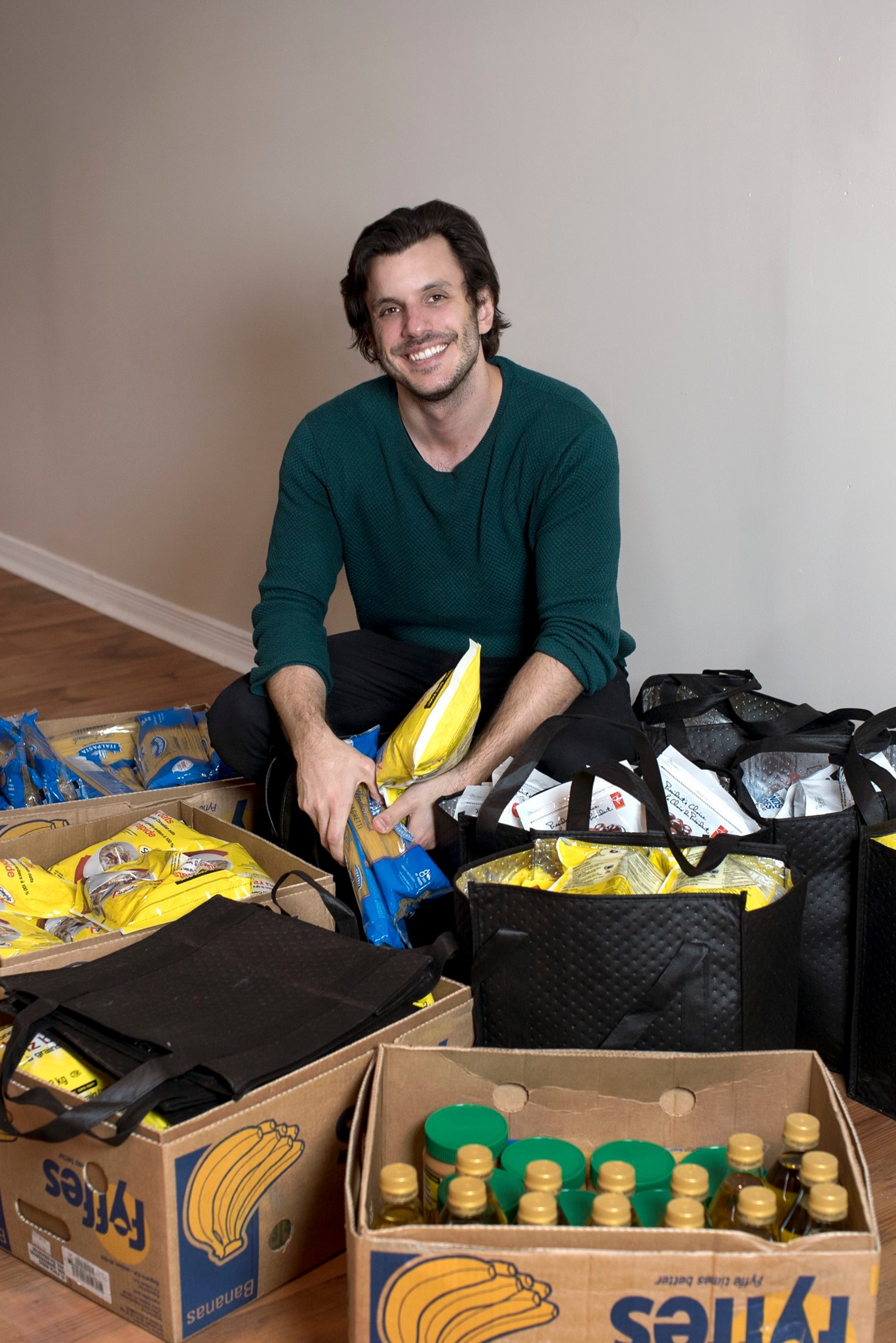[vc_row][vc_column][vc_column_text]Social entrepreneur Adam Zivo deploys LifeCrate, a non-for-profit food box delivery initiative to low-income, at risk seniors in Toronto. [/vc_column_text][vc_separator color=”custom” accent_color=”#1a99b2″][/vc_column][/vc_row][vc_row][vc_column][vc_column_text]Like many Canadians Adam Zivo’s life intersected with the novel coronavirus when he least expected it.
In early March Zivo and his mother both returned to Canada following respective trips out of the country. Both entering self isolation immediately upon landing, as per the government’s announcement, he realized he’d be unable to bring his mother any necessary goods and groceries as he had planned to do. While his mother was able to use a local delivery service to get the food she needed, Zivo considered the thousands of high-risk Torontonians who did not have the resources to do so.
“I felt that it was important to help those people, and so I started writing the project plan on the plane back to Canada,” said Zivo.
At that point LifeCrate was born. A non-profit, volunteer-based service that delivers subsidized food crates to low-income Torontonians aged 65 and older, LifeCrate is dedicated to keeping at risk Torontonians fed and safe during the coronavirus pandemic. [/vc_column_text][vc_single_image image=”17332″ img_size=”full”][vc_column_text]In contrast to other grocery and food delivery services available in Toronto, LifeCrate is a standardized food box. This means that seniors receiving their box month to month will know exactly what they are getting with few substitutions. This kind of dietary stability Zivo says is helpful for seniors in managing both physical and mental well being.
“This creates a sense of predictability and security for those who receive our aid, which is crucial since predictability creates a sense of control, which, in turn, has positive mental health impacts,” said Zivo.
The package will feed the average person 2,300 calories, 315g carbohydrates, 72g fat, 100g protein per day for approximately 30 days at the extremely low cost of $75. Whereas other food services last on average two weeks, LifeCrate has created a model with the assistance of registered dieticians that provides nutrient dense foods for double the time. With every LifeCrate comes meal and nutrition advice from the same dieticians who helped create the box in order to help recipients manage their food correctly.
As food banks continue to be overwhelmed by service demands and the state of the pandemic continues to alter day by day, for the latest in our Start-Up Spotlight series, Bay Street Bull spoke to Adam Zivo to discuss his passion for social entrepreneurship and how he sees LifeCrate helping Torontonians beyond COVID-19. [/vc_column_text][/vc_column][/vc_row][vc_row][vc_column][vc_text_separator title=” Q & A ” color=”custom” accent_color=”#1a99b2″][vc_column_text]LifeCrate is a non-profit organization. Does the company pull any revenue in order to function? What is the funding model?
Currently we’re funded by corporate and community donations. We received some great seed funding from Meridian Credit Union, as well as food donations by Sofina Foods and Summer Fresh, among others. Initially, our model was to subsidize 50 to 70 percent of the costs of each LifeCrate, charging a $75 end fee for recipients. This would’ve allowed us to stretch our financial resources farther, but it’s proving to be a barrier to program uptake, so we’re reassessing that. With any sort of start-up, non-profits included, there’s a great deal of fluidity. That’s only been exacerbated by the chaos of the COVID-19 crisis. Even with all of that considered, we’re expecting corporate donations to be our main revenue stream going forward. Our team is highly experienced with storytelling, content, and branding. These skills may seem auxiliary, but they’re vital for incentivizing corporate donations, since corporate donors generally value having their contribution properly communicated. Hence, as we grow, we see ourselves as making it easier for the private sector to buy into supporting grassroots food aid.
What inspires you to actively put yourself out there into the public and in harm’s way?
There can sometimes be something cold, almost solipsistic, about the calculation of self-risk. It can inadvertently erase the humanity of those we can help, since their well-being recedes in light of our own. We need to be mindful of that, to remind ourselves that, as far as risk goes, other people aren’t abstract ideas. They’re people. I spent the following days in a contemplative daze, and I decided to reject the idea that we should only help others so long as there’s little risk to our own wellbeing. What does it say about us if we only want to help so long as it doesn’t cost us anything? That’s not me. It doesn’t align with my values.
As for the inspiration to do good, it’s instinctual. For whatever reason, I’m just built this way. I know my values, and only by living in accordance with them do I feel free and as if I know myself. Thus to do good is both an obligation and a pleasure. I also happen to be good at these things. So it all just makes sense. When an opportunity to help other people comes up, in a concrete and practical way, it’s my duty to explore it. Maybe that sounds high-minded and insufferable, but I want to clarify that I’m not particularly proud of having these instincts. Truthfully, I find it embarrassing to be called a good person. This strong sense of ethical duty is just a fact of life, and I pursue it because it feels natural, like a machine following its programming.[/vc_column_text][/vc_column][/vc_row][vc_row][vc_column][vc_single_image image=”17333″ img_size=”full”][vc_separator color=”custom” accent_color=”#1a99b2″][vc_column_text]What questions do you think all leaders or entrepreneurs should ask themselves before building a company or trying to implement change? What did you ask yourself?
The lessons I have are specific to social entrepreneurship. The first thing is to be practical and realistic. There’s no shortage of people who have good intentions but can’t get things done, or do things very inefficiently, because they romanticize their own projects. That’s a failure of responsibility. Your job, as a social entrepreneur, is to make real impacts, not just good feelings. This requires being clear-eyed, sometimes even witheringly critical, about the situation at hand. A good way to put this principle into practice is to define very specific goals to which you can hold yourself accountable. Not ‘We want to help people’ but ‘We want to deliver X units in Y period of time’ something measurable. Then, once you’ve established your performance indicators, try to stick with them as much as possible, while making adjustments when absolutely necessary. Also, be open to starting with an imperfect solution and then adjusting your model. You are not a government social program with months worth of planning and ample resources. You don’t need to be perfect.
As a last piece of advice, avoid consensus-based decision making. I’ve seen enough socially-minded programs, whether grass root or established, waste unimaginable amounts of time on gratuitous consensus-building. You don’t need that, especially when you’re starting out. People can’t eat consensus. Establish a clear decision-making hierarchy. Find talented people to lead your teams, and then give them autonomy. Ensure that, even in a hierarchical system, volunteers are listened to, respected, and empowered. They are donating their time and you owe it to them.
LifeCrate is a timely idea that is helping an at risk population but what is the longevity plan for this venture?
The need for food aid is not going away anytime soon. Regardless of how long it takes for this pandemic to resolve, the global economy has just entered a period of recession, possibly even depression, that will last for at least two years.
Even post COVID-19, there will always be food insecure individuals, and our nutritionally-sensitive approach can add value to the generalized food aid space. Continued funding requires longer-term partnerships with corporate players, possibly even government buy-in, but we’re fairly confident that we can arrange that given our talent and the positive response we’ve seen so far. One interesting thing to note is that, through our partnership program, we’re atypically focussed on empowering other grassroots organizations. There are many organizations and individuals trying to start their own food aid programs, but they’re currently very siloed, and so we’re working on coordinating and empowering the smaller players. As we grow and build out our capacities, we see that side of our operations becoming more important — pro-bono consulting and networking building for grassroots food aid programs.[/vc_column_text][/vc_column][/vc_row][vc_row][vc_column][vc_single_image image=”17334″ img_size=”full”][vc_separator color=”custom” accent_color=”#1a99b2″][vc_column_text]What values are at the heart of LifeCrates and how do you implement that into daily processes?
We’re about collaboration and bringing people together. This is both a product and symptom of our processes. Given our limited resources, a big concern for us was how to filter delivery requests according to need, and so we decided to focus on developing a referral system wherein community organizations could send people over to us who they’d pre-screened. Through our community outreach, we found that many community organizations are looking to implement their own food aid programs. In response to that, we quickly launched a partnership program to help boost them. We partnered with the Black Coalition for AIDS Prevention (Black CAP) to help them launch Canada’s first food aid program for the African-Carribbean-Black Community. As part of that, we hooked them up with food suppliers and facilitated $1,000 in food donations to add to their inaugural delivery of fifty aid packages. We also produced an impactful video summarizing their initiative for potential donors and community stakeholders, which will help with fundraising and program uptake. We aim to replicate this kind of success with other organizations going forward, and have a few other partnerships in the works.
What in your opinion defines success and what defines a good entrepreneur?
The definition of success is context-sensitive. I personally think of success as living an exciting life, doing things that interest you, and living in accordance with your values. We have one life to live, and I’d rather not spend it doing stultifying work. Hence, for me at least, success doesn’t necessitate an excessive amount of money, just whatever allows for the comfortable pursuit of your interests.
As for good entrepreneurship, from my perspective the defining attributes of good entrepreneurs is accurately knowing what people want. What do your stakeholders want? What do your customers or clients want? It sounds basic, but so many failures in entrepreneurship come from incorrectly assessing people’s interests. We too often respond to what we’d like the world to be, rather than the world as it is. I’m of the belief that, so long as you know what motivates people, everything else falls into place.[/vc_column_text][/vc_column][/vc_row]













